Sex, love and immortality: Behind the obsession with vampires
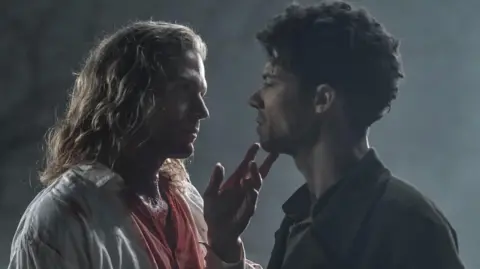 BBC/Larry Horricks/AMC Network Entertainment LLC
BBC/Larry Horricks/AMC Network Entertainment LLCImmortal, bloodthirsty creatures that feed on humans - they have sharp fangs and a hatred for sunlight and garlic.
Vampires might not be the hero you typically root for, but they have transfixed us for centuries.
The first short story about the monster written in the English language was John Polidori's The Vampyre in 1819.
More followed, with Bram Stoker's Dracula in 1897 inspiring F.W. Murnau's silent film Nosferatu in 1922. This is now being remade by Robert Eggers and is set to be released in the UK in 2025, starring Bill Skarsgård, Lily-Rose Depp and Nicholas Hoult.
But what's driving our hunger for vampire stories?
For writer and actor Mark Gatiss, his fascination with vampires started early. The co-writer of BBC drama series Sherlock and Dracula has been a "horror obsessive" for as long as he can remember.
Gatiss went on from a childhood love of scary stories to star as Dracula in an audio production, made a documentary on the monster as well as a 2020 BBC series, which sees the Count (played by Claes Bang) venture to London.
He says the opportunity to bring Stoker's iconic vampire to life felt "too good to be true".
"Like Sherlock Holmes, it's an imperishable myth and, really, if anyone gives you the chance to have a go at it - you have to do it," he explains.
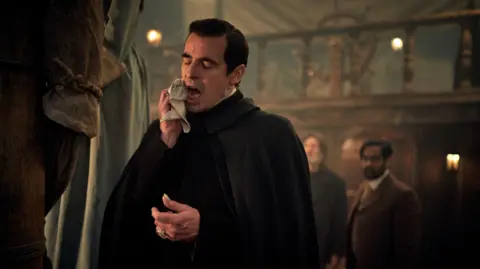 BBC/Hartswood Films/Netflix/Robert Viglasky
BBC/Hartswood Films/Netflix/Robert ViglaskyRolin Jones is an executive producer and a writer on the TV adaptation of Interview with the Vampire, based on Anne Rice's collection of novels.
The series, available on BBC iPlayer, follows vampire Louis de Pointe du Lac (played by Jacob Anderson) who shares the story of his life and relationship with Lestat de Lioncourt (played by Sam Reid) with a journalist.
He explains stories about the vampires "come back over and over again" because they "get in your bones and haunt you," with many raising questions of immortality, death and love.
The modern popularity of the figures can be seen on social media with #vampire having 2.7 million posts on TikTok.
Jones adds that each day he will see more people tattooing the characters' faces on their body, explaining "this is a rabid fan base".
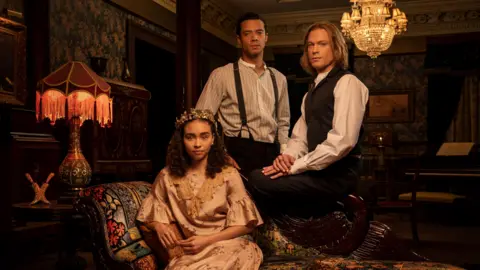 BBC/AMC Network Entertainment LLC
BBC/AMC Network Entertainment LLC'Scared me to death'
While the characteristics of fictional vampires have changed throughout history - some burn to a crisp in the sunlight, others have famously sparkly skin - they have one thing in common: immortality.
Dr Sam George - an associate professor at the University of Hertfordshire who taught students about vampires in fiction - explains that part of the reason the monster endures is because they "get us to think about the big questions that concern us, ideas about ageing" as well as "what happens beyond the grave".
She adds that "the vampire's always been linked very strongly with disease, with contagion," adding that if we look back in history we can see that our interest in the immortal monster seems to pique around times of mass disease.
"When the first fictional vampire appeared in 1819, there was a strong link with tuberculosis," she says.
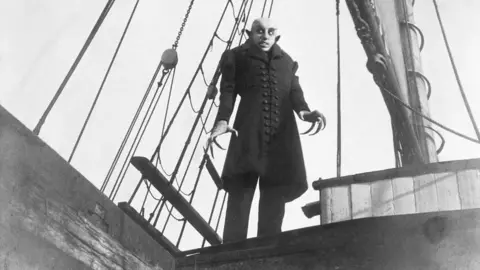 ullstein bild Dtl./Getty Images
ullstein bild Dtl./Getty ImagesShe adds that F.W. Murnau's silent film Nosferatu in 1922, centring on a character famous for the plagued rats he brought in his wake, came shortly after the Spanish influenza pandemic.
The academic adds that this is "really important to why vampires are so popular and on trend now, when you think of Nosferatu and its link to the plague, post Covid we're very interested in the vampire as contagion."
Executive producer Jones adds that a key point of interest for him lies in working out why vampires want to keep living. "You take mortality out of any drama, and it's quite interesting," he says.
Jones adds that Ms Rice herself wrote the novel after losing her daughter and that this sense of "grief and mourning" is "exceptionally articulated" in the book.
'They seduce you'
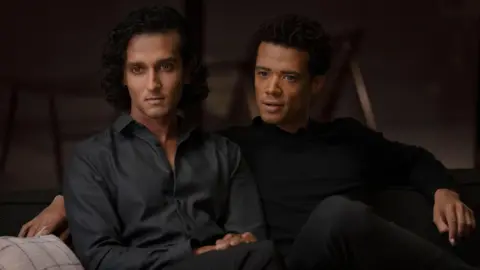 BBC/Larry Horricks/AMC Network Entertainment LLC
BBC/Larry Horricks/AMC Network Entertainment LLCWhile vampires may let us play out our fears about mortality and death, Jones adds that there is something else that draws us to the fanged figures.
"They're the sexiest, the most sensual of monsters," he says. "They seduce you."
Jones adds that when he first picked up the novel Interview with the Vampire, "it seemed to me what I was reading was this really repressed and really messy love story."
Dr George agrees, explaining "vampires have gotten younger and better looking over the years" and notes the difference between Nosferatu and Twilight's Edward Cullen (played by Robert Pattinson).
The academic adds there has been "a shift" in the way people read vampire fiction, explaining there has been a lot of interest in the topic of sexuality and vampires, like the "queer family" presented in Ms Rice's novel.
The combination of love and immortality, Dr George says, is also seen in Francis Ford Coppola's 1992 film Bram Stoker's Dracula, which ran with the tagline "love never dies".
For Dr George, the "sense that the vampire can address a number of questions all at once," from death to love is the reason it stays with us today.
